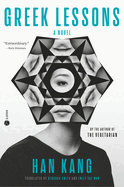
Greek Lessons, written by award-winning Korean novelist Han Kang (Human Acts; The Vegetarian) and translated by Deborah Smith and Emily Yae Won, is a lyrical and sensitive novel about intimacy in the face of loss. At first, a Korean-born, German-raised Greek language teacher doesn't know what to make of the sharp-boned, darkly clad woman in his classroom who never speaks. But soon an unlikely bond forms between the teacher, as he slowly loses his eyesight, and the woman, who long ago lost her language. While he reflects on the estrangement he felt in every place he's called home, she struggles to open up to someone new after having lost her mother, her son, and her voice.
As in The Vegetarian, Han captures an intimate portrait of personal anguish at the same time as she evokes a larger social milieu of modern alienation and cultural loss. The poetic language of Greek Lessons leans more toward the tender than the raw, unearthing not only pain but yearning. The novel's descriptions of loss are often haunting: "She would stop reading and swallow, her throat dry. Like those times when she had to immediately press down on a cut to stop the bleeding, or, on the contrary, to strain to squeeze out blood and prevent bacteria from entering her bloodstream." They are also so deeply sensorial that they communicate a warmth of bodily connection at the same time as they announce pain. By describing "the sound of two people's lips pressing together, pulling part," Han draws readers close, even when the novel's interests are philosophical. --Alice Martin, freelance writer and editor

